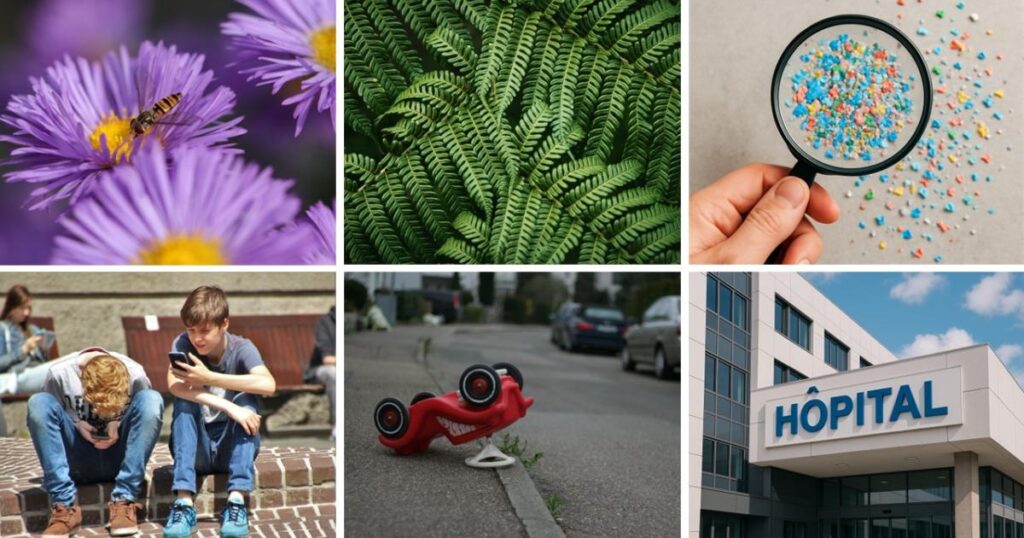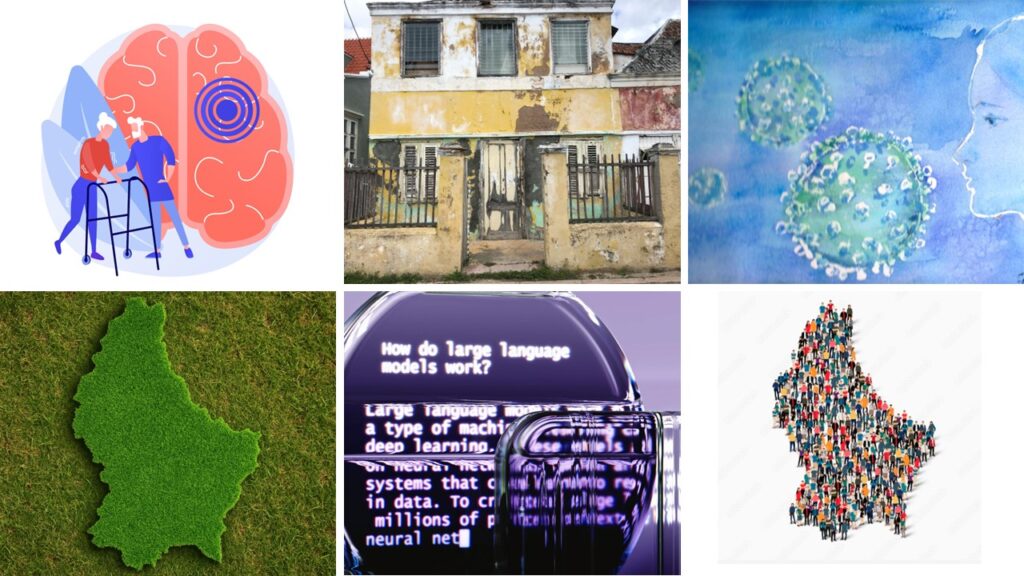10 selected Research Luxembourg results – October 2025
20 November 2025

Luxembourg News in Science & Research
Is gender equality progressing in Luxembourg? And how can we more closely monitor water resources? Here are the latest scientific news from Luxembourg.
Pexels; Pixabay; Flickr; Freepik
This article was originally in French and German on science.lu
Real estate, co-living and short-term rentals: the housing challenges in Luxembourg
Luxembourg Institute of Socio-Economic Research (LISER)
LISER researchers at the Housing Observatory analyzes the rise of new forms of housing in Luxembourg, such as co-living, short-term rentals, and shared residences. Published in ‘Note 46‘, these models—positioned between traditional housing and tourist accommodation—are transforming the rental market and creating new legal challenges. The Observatory recommends clarifying the national definition of “housing” and improving knowledge of the rental stock through a national building registry.
Note 43, for its part, analyzes the real estate market of Luxembourg’s functional area in 2024, which includes the Grand Duchy and its cross-border regions in France, Belgium, and Germany. In Luxembourg, apartments dominate, while houses are more common in the border areas. Price per square meter is significantly higher in Luxembourg—up to three times the levels observed in Wallonia or Lorraine. The study highlights cross-border contrasts in housing type, size, price, and energy performance.
Peanut Allergy: The Gastrointestinal Immune System Plays an Important Role
Luxemburg Institute of Health (LIH)
Oral immunotherapy (OIT) for peanut allergy involves giving small, gradually increasing amounts of peanut to “train” the immune system and reduce severe allergic reactions. However, success varies significantly between patients. In a new study, lead by LIH researcher Dr. Annette Kuehn, it suggests this may be due to individual differences in the gut’s immune environment, including the integrity of the mucosal barrier, immune cell networks, and microbiome composition. Considering these factors could help explain why some patients develop tolerance while others do not and may allow treatments to be tailored to each person’s intestinal profile.
Press release
Fighting Allergies with Precision: Omics Sciences Enable New Approaches to Allergy Treatment
Luxemburg Institute of Health (LIH)
A recent comprehensive article by international experts, including researchers from LIH, highlights how omics technologies are transforming allergy research and treatment. “Omics” refers to large-scale, data-rich sciences such as genomics (genes), proteomics (proteins), transcriptomics (RNA), cytomics (cells), and metabolomics (metabolites). Combined, these approaches generate detailed molecular profiles far more precise than traditional diagnostics.
The research shows how omics improves disease classification. Asthma, for example, is no longer seen as a single disorder but as a collection of subtypes with distinct underlying mechanisms. Molecular signatures identified through omics can classify asthma patients more accurately, enabling personalized treatments.
Similar advances have been reported for atopic dermatitis, allergic rhinitis, food allergies, and drug hypersensitivity, paving the way for more targeted and effective allergy therapies.
Press Release
New Hope for Treating Hard-to-Treat Melanoma Using 3D Testing
University of Luxembourg (FSTM, LCSB)
NRAS-mutated melanoma is a challenging skin cancer, as current treatments often fail and over half of patients see rapid disease progression. In a new study, researchers addressed the lack of realistic lab models by testing over 1,300 compounds on 3D melanoma models using spheroids and hydrogels. They identified 17 promising candidates, including two highly effective molecules that reduced cancer cell proliferation and blocked invasive behavior, even in treatment-resistant cells.
These results open the door to repurposing existing drugs and highlight the importance of realistic preclinical models for developing better therapies.
A Virtual Model of a Luxembourg City Helps Optimize Urban Planning Decisions
Luxemburg Institute of Science and Technology
The BISTWIN project, led by LIST in collaboration with the City of Bissen, created a digital twin of the “Um Rouscht” industrial zone. This virtual model, based on real traffic data, allows simulations to anticipate the impact of mobility-related decisions, such as new building construction or electric shuttle services. “Um Rouscht” hosts over 60 companies and around 2,500 workers, where mobility issues can have significant economic consequences.
Two case studies demonstrated BISTWIN’s usefulness: one on infrastructure planning, and another on electric mobility services with Emile Weber. The results provided concrete recommendations to reduce congestion and optimize energy consumption.
Supported by the Ministry of the Economy, this project represents a major advance for transport planning in regional industrial zones, paving the way for smarter, more sustainable, and collaborative urban development.
Press Release
Entrepreneurship on the Rise in Luxembourg, with AI and Sustainability in Focus
Entrepreneurship in Luxembourg continues to grow, with nearly 10% of residents in 2024 actively involved in a new business, up from 7% in 2022, according to the latest GEM report from STATEC. Fear of failure among aspiring entrepreneurs also fell to a record low of 41%, signaling growing confidence in the business environment.
Luxembourgish entrepreneurs stand out for their commitment to sustainability and social impact, with more than half actively reducing environmental impact and two-thirds focusing on social initiatives. Artificial intelligence is increasingly seen as a key tool: 34% of entrepreneurs consider AI “very important” for their business, the highest share in Europe, although concerns about data privacy remain.
The report also highlights ongoing inequalities and barriers. Fewer women launch businesses compared to men, while immigrants participate at higher rates than native residents. Access to office space and financing continues to challenge many early-stage entrepreneurs.
Despite these hurdles, the upward trend in entrepreneurial activity suggests a vibrant and evolving ecosystem in Luxembourg, with innovation, sustainability, and technology at its core.
Press Release
Rethinking Luxembourg’s Attractiveness: A Century of Tax Competitiveness
University of Luxembourg (C2DH), Luxembourg Chamber of Deputies
A recent 128-page study by the scientific unit of Luxembourg’s Chamber of Deputies, with contributions from University of Luxembourg researchers, examines the country’s fiscal competitiveness over the past century. The analysis shows that many multinational companies historically paid far less than the official corporate tax rate—sometimes as little as 0.9% compared with the nominal rate of over 29%.
The study traces Luxembourg’s strategy back to 1929, when flexible legal frameworks were introduced to attract capital and businesses, helping establish the country as a major financial hub. Recent European reforms and court decisions, however, have pushed Luxembourg toward greater transparency.
Today, the Grand Duchy seeks to maintain its attractiveness through innovation, stability, infrastructure, and a skilled workforce, moving beyond reliance on tax advantages alone.
Press Release
Gender Equality in Luxembourg: Progress and Persistent Challenges
Observatory for Gender Equality
The 2024 activity report (French) from Luxembourg’s Observatory for Gender Equality highlights both achievements and ongoing issues. Women now earn slightly more than men on average in industry, construction, and services (excluding public administration), and their life expectancy remains higher, though men enjoy more healthy life years.
Despite these advances, women remain underrepresented in advanced digital skills, such as programming, and in decision-making positions. Domestic violence incidents reported to police are also on the rise.
The Observatory, overseen by the Ministry of Gender Equality and Diversity, serves as a key tool for implementing evidence-based public policies aimed at addressing these persistent gaps.
Press release
Luxembourg’s Macroeconomic Outlook: Moderate Growth Ahead (2025–2029)
STATEC’s latest projections anticipate a gradual recovery for Luxembourg’s economy amid ongoing international trade and geopolitical tensions. GDP is expected to grow by 1% in 2025, strengthening gradually to around 2.5% by 2029.
Employment growth is projected to remain modest, struggling to reach 2%, while unemployment is likely to decline significantly only from 2027. Inflation is expected to fall quickly after a slight rebound in 2025.
Energy prices are forecast to drop sharply in 2026—nearly 7%—driven by lower oil prices and government measures on electricity tariffs. Overall, the projections point to a steady but cautious economic expansion, with moderate improvements in jobs and inflation over the medium term.
Monthly Hydrological Bulletin Launched to Monitor Luxembourg’s Water Resources
Luxembourg Institute of Science and Technology (LIST)
LIST, in collaboration with the Water Management Administration, has launched a monthly hydrological bulletin to provide an accessible overview of national water trends. The bulletin aims to strengthen understanding of Luxembourg’s water resources among policymakers, researchers, and the public.
Each month, the bulletin will present long-term data on precipitation and river flows, offering insights into how the country’s watersheds respond to climate changes. River flow is one of the most sensitive indicators of climate variability.
Recent decades have seen both heavier rainfall events and longer droughts in Luxembourg, highlighting the increasing pressure on its hydrological systems.
Explore the first issue: English version // French version
Check out more reports: here
Author: Diane Bertel
Editor: Lucie Zeches (FNR) ; Nicolas Stamets (Research Luxembourg)












